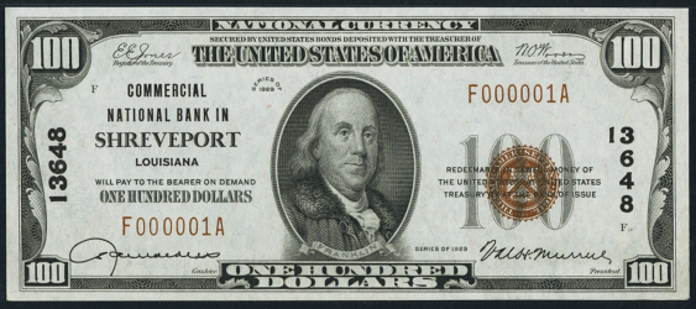One Hundred Dollar Notes › Nationals › 1929 One Hundred Dollar National Bank Notes › Kentucky Charters › 1929 $100 Uniontown Kentucky First National Bank
Get Value Now
| Item | Info |
|---|---|
| Series | 1929 |
| Charter | #8622 First National Bank of Uniontown, Kentucky |
| Year Chartered | 1907, 490 Banks Chartered |
| City Info | Uniontown is a home rule-class city in Union County, Kentucky, United States. The population was 1,064 at the 2000 census. The name derives from the fact that the city was formed by merging the towns of Francisburg and Locust Port. The John T. Myers Locks and Dam, once known as Uniontown Locks and Dam, is located downriver 3½ miles. Source: Wikipedia |
| Similar Cities | If your note doesn't match try: 1. Uniontown, Pennsylvania - First National Bank 2. Uniontown, Pennsylvania - National Bank of Fayette County 3. Uniontown, Pennsylvania - Second National Bank 4. Uniontown, Pennsylvania - Uniontown National Bank and Trust Co. 5. Uniontown, Pennsylvania - Third National Bank |
| Seal Varieties | Small Brown |
| See Also | If your note doesn't match try: 1. 1929 $100 Federal Reserve Bank Note 2. 1928 $100 Federal Reserve Note 3. 1928A $100 Federal Reserve Note 4. 1934 $100 Federal Reserve Note 5. 1934A $100 Federal Reserve Note 6. 1934B $100 Federal Reserve Note |
| Other Info | 1. Value depends on notes known for charter, condition and market demand. |
| Neat Fact | Full and partial sheets of National Bank Notes are known to exists. Families of bank officials, particularly those who signed the notes, kept them as keepsakes. Some sheets are extremely valuable. Others are more common. |
No Obligations Offers and Appraisals
Please submit a good photo or scan. It will be identified and evaluated. Understand there may be subtle differences between the image you see above and your note. Signatures, design, markings and note condition will determine the offer price. Notes in Uncirculated or better condition receive the best offers.
Appraisals can be estimated for wholesale and retail prices. Wholesale is what dealers typically pay. Retail is what a collector might pay. Retail is slightly higher in most cases.
Please visit this page for USA Paper Money Reference. Do not treat this page as a reference guide, it is for appraisal and acquisition purposes only.
